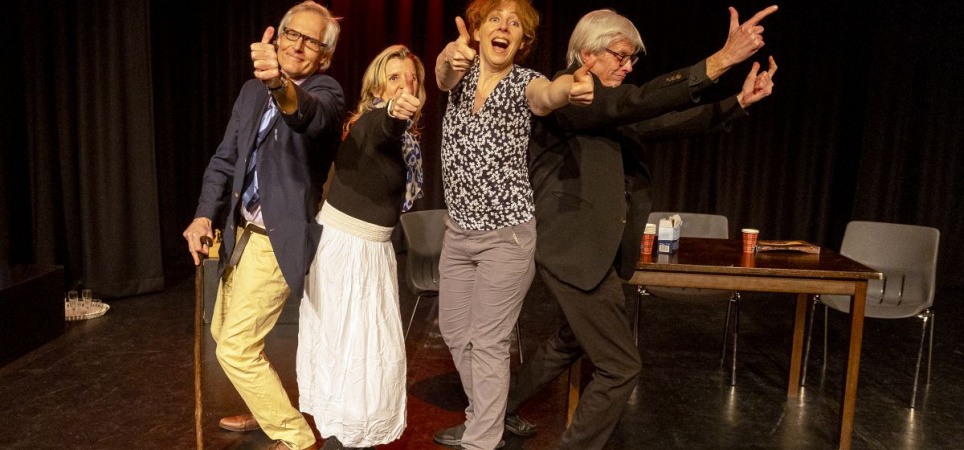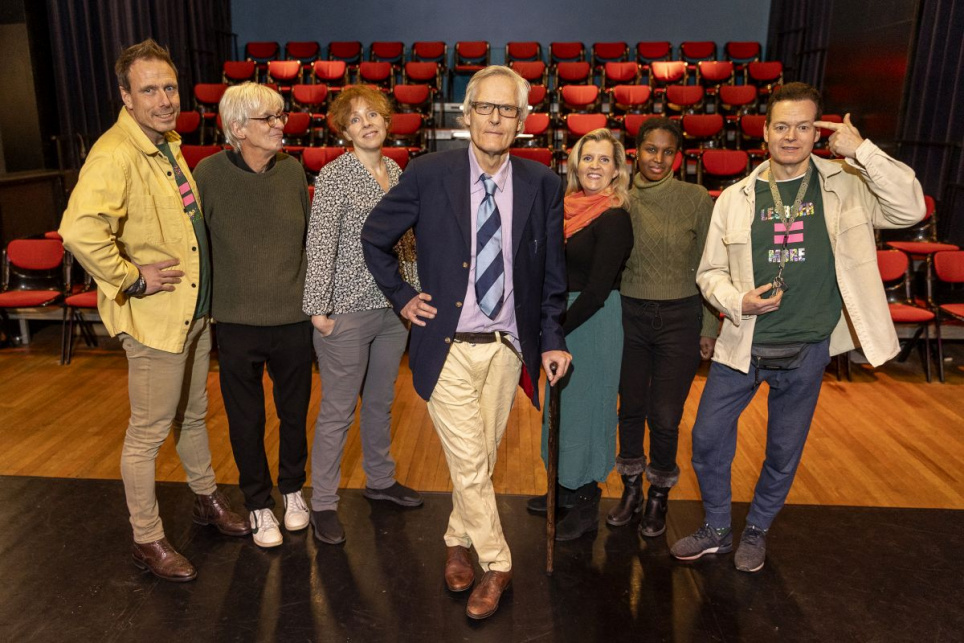Teacher sidelined after theater satire about education
Upon his retirement from the Amstel Academy, teacher Coen van Heycop ten Ham staged a satirical play about the role of educationalists and managers. That was not well received by everyone. A reprise of the performance will be performed next Sunday.

Fred van Diem
Flowers, cards, a basket full of gifts and warm words from dear colleagues. Coen van Heycop ten Ham gratefully accepted it all upon his retirement from the Amstel Academy last December. And the teacher also distributed himself. Not as usual with a farewell lecture or a reception, because he is not the type for that. He treated his colleagues to a real theater performance, inspired by his own educational experiences.
'Quality College' is a satirical play about a training institute that collapses because highly paid managers and educationalists waste time and money on side issues, while overburdened teachers succumb to the workload. In the story, all kinds of tasks are passed on to the increasingly scarce trainers. “When a teacher asks you to help, you always say that it is too substantive. Content is something that those teachers find so terribly important. Then they can take care of that themselves,” says director 'Faas Vonk' in the performance, played by Van Heycop ten Ham himself. The comment draws laughter from the stands. After the private retirement premiere, the performance was performed four more times and attracted a lot of attention in the Amsterdam Polanentheater. Next Sunday the company will perform a takeover on the shelves.
This is an article from the Onderwijsblad. Would you like to receive the magazine? Become a member!
But the fictionalized performance was not well received by everyone. To his astonishment, Van Heycop heard just before Christmas via a telephone call that he and his wife were no longer welcome at the institute. He received dozens of messages of support from colleagues who disagree. This message led to quite a bit of outrage on social media and the comparison with Paula van Manen was quickly made. Has another teacher become persona non grata after critical reflection on their own organization?
Work floor
On a Friday morning in January, he and his wife Andrea de Leeuw talk about the lead-up and the aftermath. She founded the Amsterdam theater group Los Zand thirty years ago and wrote the play. She is also a freelance training actress at the AMC and InHolland University of Applied Sciences, among others. This is someone who plays simulations and role plays with students to, for example, train conversation skills. She also did that - at least until this performance - at the Amstel Academy. The institute is affiliated with the VUmc and provides education, training and courses for healthcare workers.
Her husband Coen was a teacher of pathology and expert in clinical reasoning there, and has built up a long track record of service over a career of 35 years. It was logical that with his experience he would remain available as a teacher for hire after his retirement, that was the intention. The theater couple thought his official farewell would be a good opportunity to reflect on his own educational organization with a good dose of irony. And on the test of time, in which the professional control of teachers subject to erosion is.

On the far left of the photo: Bob Groos. In the middle: Coen van Heycop ten Ham On his right: Andrea de Leeuw. Image: Fred van Diem
“I come from a time with respect for the autonomy of teachers,” says Van Heycop ten Ham. “The goals we had to achieve were clear, it was left to teachers how to achieve them. Over time, more and more educationalists and managers came to become involved in education and the work of teachers. That meant: registering more, but no reasonable distribution of that extra workload.”
More and more educationalists and managers came to become involved in education and the work of teachers
The term 'workshop' is often used in his account. “There are actually two organizations. There is a workplace that does fantastic work, with great respect for and from students. Above that there is a group of people who no one understands what they are doing, who have little or no contact with students, but who constantly come up with all kinds of demands. And the worst thing is that every year I have seen some enthusiastic trainers become overworked because they did not receive the guidance they needed.” According to the teacher, this frustration is felt by more colleagues. “That was also evident from the reactions to the play. But no one dares to say anything, because criticism is not appreciated. When I once called someone a 'meeting tiger', I had to apologize, otherwise I would have to come for a performance review.”
Pomegranate
Annoyance about unsubstantiated educational innovations and interference from 'above' is more widespread in education. Before his wife put the performance on paper, they spoke together in preparation with a dozen teachers at universities, colleges and secondary schools. Van Heycop ten Ham: “We have not spoken to a single teacher who is positive about what educational experts impose. These people often have no teaching experience themselves, but they overload the workplace with their innovations and quality requirements. The rise of educational experts and the decline of the Dutch educational level are remarkably synchronized.”
“Two actors who are close to education and recognize a lot in it are also participating in this performance,” says Andrea de Leeuw. “One of them has a daughter who worked in primary education, but she stopped precisely because of the things that are highlighted in the piece. And the other actor comes from a teaching family.”
Bob Groos, the actor in question, confirmed the latter on the telephone a few days later. “I auditioned for this performance and the script really appealed to me. My parents have worked in primary and special education all their lives. I can't remember anything other than that they regularly came home frustrated. Just let teachers teach and do what they are good at. It is a wonderful profession, but people just can't keep it up this way anymore.”
Groos thinks it's a shame and unnecessary that the performance got such an unpleasant ending. “The King also used to have a jester, satire is part of society. If someone takes so much trouble to present you in such an original way that it all makes sense, then take advantage of it.”
The King also used to have a jester, satire is part of society
“We have no problem with the criticism in the play. It is also nonsense that you will be fired from us by criticizing," responds director Wim Polderman, who first sends a detailed response by email. He can sympathize with some of the criticism, he says later on the phone. “We could easily start a discussion about that together. We also have that space.”
Polderman has not seen the performance himself, but he says he is upset about what it has caused. “Although the names of the characters are made up, this audience understood very well who it was. Some felt hurt or insulted, others felt uncomfortable because colleagues were made fun of. That has a polarizing effect in our organization. We have not declared Coen 'persona non grata', but we have indicated that he has sidelined himself as a result. That's a shame, because saying goodbye should be something festive. Especially with an icon like Coen, because his teaching was really appreciated.”


